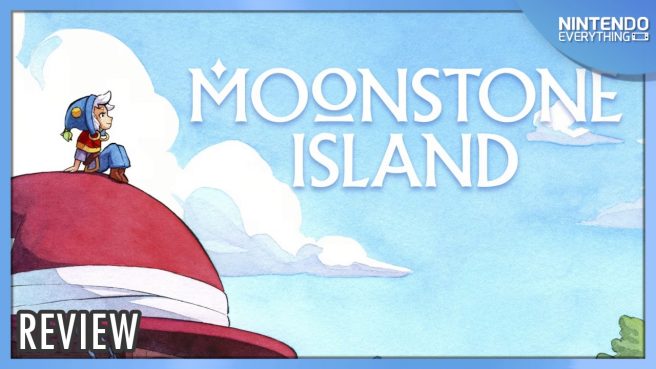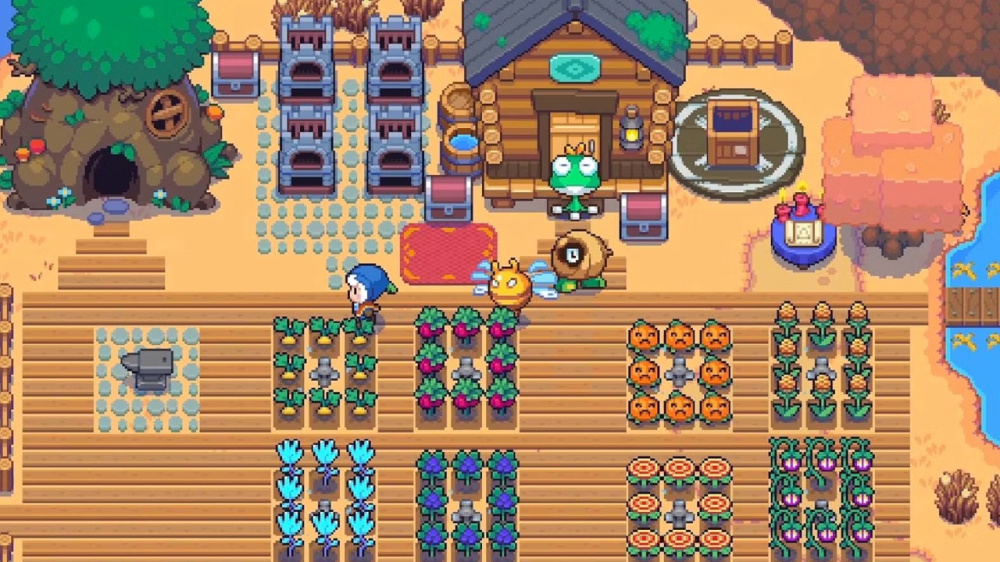[Review] Moonstone Island
System: Switch
Release date: June 19, 2024
Developer: Studio Supersoft
Publisher: Raw Fury
It’s always refreshing when developers make an effort to shake up a genre by injecting something new into it. It often yields unexpected surprises, or at the very least a different experience, which is equally as valuable in an overcrowded genre. Moonstone Island is another game that has taken the bold and ambitious move of throwing half a dozen different gameplay mechanics from assorted genres into a blender to see what comes out. The result is nowhere near as messy as that implies, but more care could have been taken with what was included nonetheless.
The premise of Moonstone Island is a little different from your standard life sim fare: a young alchemist, your character has just finished school and is now about to set off on their own for a year to make their mark on the world. Unfortunately, their broom breaks partway through their journey, and they crash on the titular Moonstone Island, one in a cluster of many floating islands, populated by a number of helpful (but rather forgettable) NPCs. It’s as good a place to set up as any, right? There is a larger story to be found here as you progress through the game, but like many life sims this more about the story you choose for yourself, as you can focus on which characters you want to interact with, when you want to complete the main story quests (if at all) and how you spend your time.
It may sound like your standard life sim, but from a gameplay standpoint Moonstone Island is a lot of things. It’s a life and farming sim, but also an open world adventure game, a turn–based card battling RPG, and it pulls inspiration from any number of different genres as well. Some of these things it does better than others, but the most noteworthy, and indeed admirable, thing about the game is that nothing is inherently broken in such a way that you’ll never be able to progress. The game might slow your pace to a frustrating crawl (and it will do this in its opening hours with alarming frequency) but everything that you do has a purpose, and contributes towards your ultimate objective, which is nicely laid out for you in your journal to remind you in case you ever forget. It’s never difficult to find out exactly what it is you need to do, and there is never any pressure placed on you to do it.
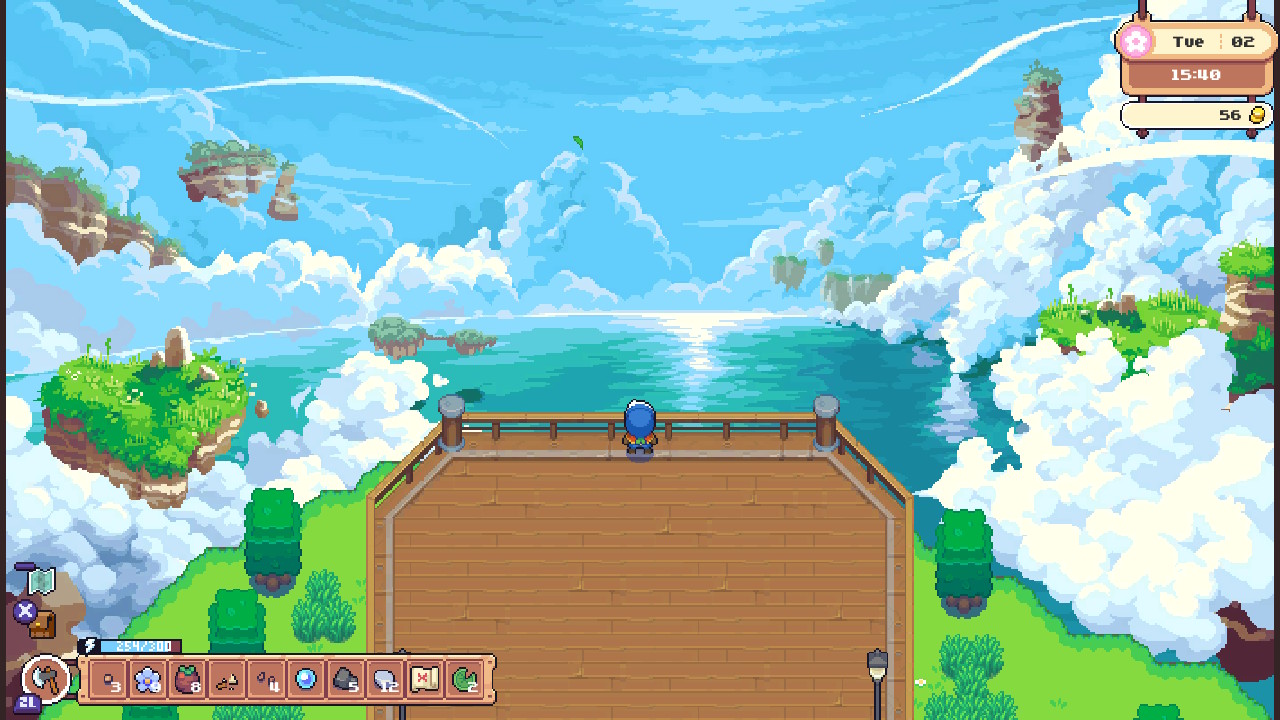
Moonstone Island allows you to do what you like at your own pace: if you feel like spending the day planting seeds, deforesting the surrounding area, or hammering away at rocks in the mine, it’s entirely your call. Your only limitations come in the tried-and-true day and night cycle and stamina meter. Whatever you want to do on that day needs to be done before your stamina runs out or 2am, whichever comes first. Failure to heed these restrictions means collapsing from exhaustion and waking up later than usual the next day, giving you even less time to accomplish things. You can adjust the speed at which days progress in the menu and you can restore stamina by eating, so there are ways to manage these things in-game to minimize any pressure you might feel to get things done or to speed things along, to a degree.
However, despite the freedom the game allows you in how you spend your time, it is a deceptive illusion at best. You might be able to choose when you do something, but not if you do it. Moonstone Island requires you to do everything at some point, whether you want to or not, and therein lies the problem. Not all of its various gameplay systems have been created equally, and although they all fit together far more neatly than you would expect, some feel as though they have been included for the sake of being included, or rammed into place with unnecessary force with no regard for how they might impact the overall picture.
For example, growing crops will give you items for restoring your stamina and your spirit’s health. It’s not a very engaging or enjoyable way to spend your time, consisting of the usual tilling the soil, planting the seeds, and waiting a requisite number of days until you can harvest them for a small, unsatisfying gain that does not feel as though it was worth the time you had to put into it. But if you neglect this you will find yourself struggling in the game’s dungeons, as your spirit’s health and character’s stamina is slowly chipped away and you collapse. The game does allow you to speed this up using the Alchemist’s Wand item, but this costs a large amount of stamina to use, meaning you’ll be spending the time on the crops regardless.
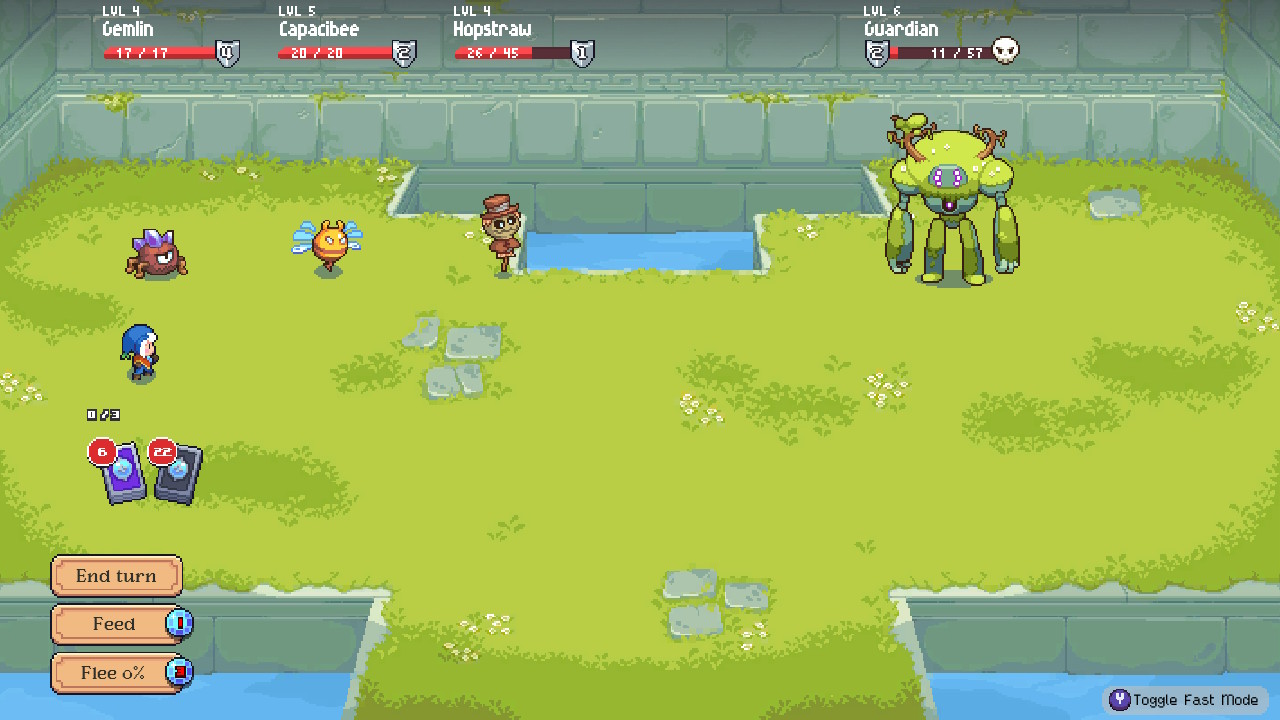
To be able to use stronger spirits you need to craft certain items, which requires a lot of hacking away mindlessly at trees and rocks for resources, waiting for forges to prepare ingots, and recipes that gradually become more complex or expensive to manufacture. The most needlessly frustrating progression block here is acquiring Moonstones: these only spawn at night, and only one per island. With many essential recipes requiring Moonstone ingots, which need three Moonstones per ingot, it slows things to a crawl, and you have to engage in several days’ worth of tedium before you can make any progress.
None of this would be a problem if it was a little more engaging, or you could dip in and out of it the way you can in similar titles that blend farming and life sim elements with dungeon exploration and combat such as the Rune Factory series, but many of the life sim staples of Moonstone Island are incorporated into the game at their most basic level, and their inclusion feels more like a box-checking exercise for the genre than it does something that adds real value to the gameplay loop. You can only progress so far in dungeons before a lack of items or the ability to use better spirits will force you back to grinding these out at your homestead, waiting around for resources, or for night to fall so you can try and locate the single Moonstone on the island, and this doesn’t feel so much like a welcome break as it does a forced interruption when you want to explore but are frustrated by the lack of resources.
Adjusting the pace at which you play to suit the game can also be problematic at times outside of being forced to engage with the weaker life sim elements. Waiting around for NPCs to show up to let you access shop facilities or trying desperately to clear a dungeon before the day ends are not uncommon occurrences, and further frustrate progression. Moonstone Island is a title that wants you to take your time to engage with everything it has to offer, to the point that it will force you to do this whether you want to or not, which gives the freedom it affords you a very artificial feeling to it: you’re not taking the game at your own pace as much as you are putting off the chores that you’ll eventually need to do to overcome the next hurdle. It’s not a flaw unique to the game, but it is a disappointing one nonetheless considering how enjoyable the other side of things can be once you get into it.
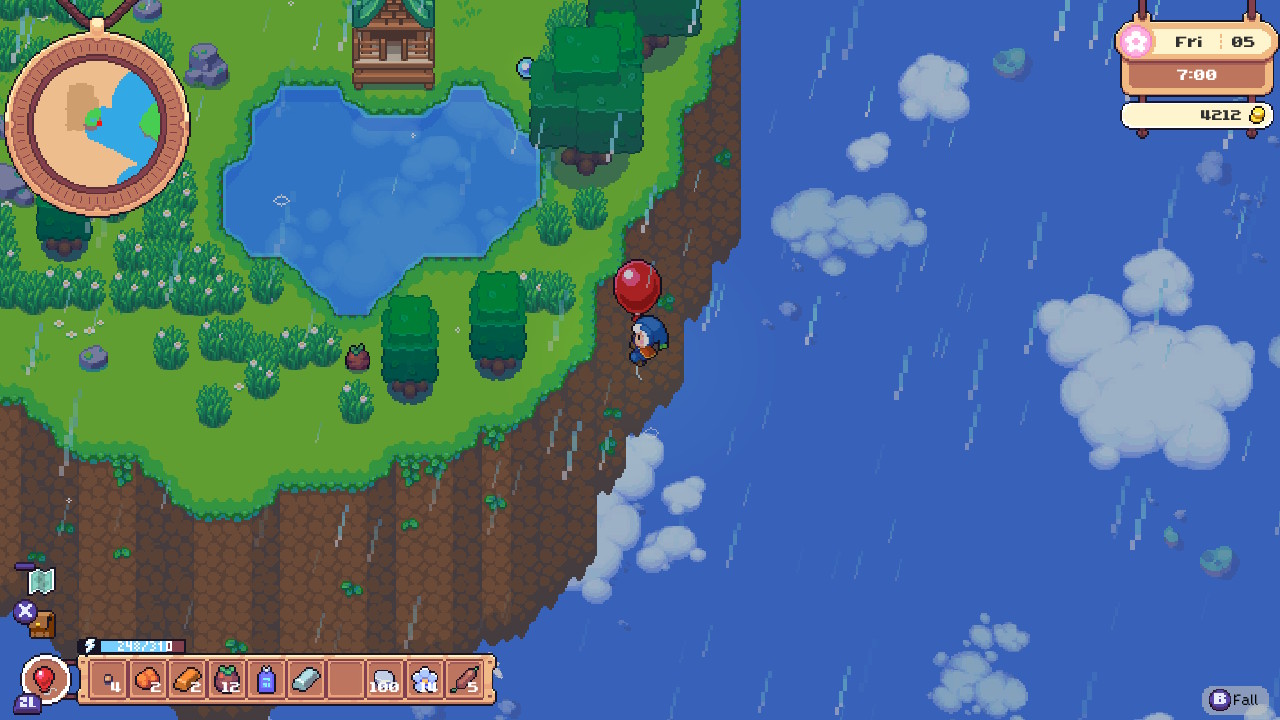
Once you overcome these initial hurdles and become an established alchemist, Moonstone Island opens up and becomes an absolute joy to play. The experience is at its best when it stops trying to be yet another life/farming sim in a vast ocean and allows you to roam the chain of sky islands that comprise the map, traversing dungeons, battling spirits, and progressing the main story quests. There is a fantastic sense of exploration in Moonstone Island as islands have their own distinct biomes and native Spirits, which become progressively stronger the farther you venture from the central island.
You’ll need to uncover the map yourself as you fly across the empty expanse, and one thing I appreciated was that there was always something to discover on each island, whether that was a new dungeon, Spirit, or flora to add to my growing collection to unlock a new recipe I could concoct when I returned home. Exploration was always rewarded and gave a satisfying sense of progression, serving as a welcome break from the tedium of the weaker life sim elements. The dungeons are quite straightforward and are generally only a handful of small rooms with some basic puzzles, Spirits, and a boss guarding a tree that will upgrade your stamina by a small amount at the end, but their inclusion adds a unique flavor to the islands, and there are a surprisingly large number of them to plunder.
Combat in Moonstone Island also works surprisingly well and is one of its more enjoyable elements. You’ll create a party of three Spirits, and each one has a deck of cards, which you’ll use in turn-based combat. You have a limited number of action points per turn, which you can use in multiple ways. You can elect to play a card from your Spirit’s combined decks, with stronger cards having a higher cost to them. The Feed command allows you to either give your Spirit an item to restore their health or boost their combat performance (provided you use the right item, of course) or to give an enemy an item to fill up a heart and recruit them to your side. You also have the option to Flee from battle, which can be upgraded to improve the odds of success via the Skill tree, although this requires all of your action points for the turn.
Both your Spirits and your enemies also have armor to reduce damage, which you’ll either need to deal with or use specific cards to break, stunning them for a turn and allowing you to deal more damage. They, of course, can do the same to you, making for an interesting back-and-forth exchange where you need to consider what cards to play, and how to structure your deck. Spirits have the usual elemental attributes, which brings with it weaknesses, resistances, and different card types, opening up the strategic elements even further. Initially it feels quite unbalanced because unless you choose one of the starters that isn’t an earth elemental, you’ll be stuck with that single element for the opening hours of the game, and will need to go through several lengthy sidequests before you have the facilities and capability to tame different spirits and vary up your team. Even once you have that ability, the game feels unfairly stacked in favor of the poison element, which does absurd amounts of damage over time, trivializing the combat if you use it, and making it a tedious chore if you’re facing it. However, there is a good amount of variety to be found here, and it becomes more complex as you progress and unlock new Spirits.
Although the Spirits are primarily vessels for their cards and share a common card pool and elemental types, they come with their own stats: when your Spirits level up you can assign points into one of four stats to improve their armor, power, speed, or health, and you will also be able to choose a card to add to their deck. Cards can also be added, removed, or upgraded outside of this via a vendor or from items acquired at gateways scattered across the islands, allowing you to customize them further.
Another one of the main elements that makes Moonstone Island so appealing is its beautiful pixel visuals, which stand out from the crowd and are a perfect fit for handheld play in particular. It has a vibrant world with a fantastic amount of detail packed in, but favors a simple design for the character models and Spirits which makes them feel unique and memorable. This is accompanied by a light and relaxing soundtrack that ups the tempo slightly in combat, giving it a nice edge that makes it feel more exciting than it may have otherwise been.
The Verdict
Moonstone Island wants to do everything at once, and it succeeds at marrying various different genres in a way that really doesn’t feel like it should work as well as it does. The problem is that a lot of its activities feel like mindless chores that pull you away from the parts of the game that are actually unique and fun to engage with. If you have the patience and willpower to push your way through that opening grind, then Moonstone Island is a highly enjoyable experience. But you are unfortunately going to have to take all the baggage that comes with it.
Moonstone Island copy provided by the publisher for the purposes of this review.
